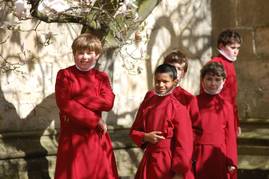
 HEN I FIRST began a children’s choir, long before our parish’s current Schola Cantorum was born, I took any child who came to me. (Frankly, I needed all the kids I could get.) That year was such a nightmare—for a whole host of reasons—that I contemplated shutting down the whole enterprise. In the end I pushed forward and things SLOWLY got better, though I still took everyone who came, regardless of ability or desire.
HEN I FIRST began a children’s choir, long before our parish’s current Schola Cantorum was born, I took any child who came to me. (Frankly, I needed all the kids I could get.) That year was such a nightmare—for a whole host of reasons—that I contemplated shutting down the whole enterprise. In the end I pushed forward and things SLOWLY got better, though I still took everyone who came, regardless of ability or desire.
Several years later I attended my first conference on the training of the child chorister at St. Thomas in New York. Someone in our group asked Dr. John Scott, the choirmaster, how recruiting was going for the choir for the following year, and Scott replied that he was a little concerned because only 8 boys had auditioned and he had only accepted 4 of them (boys who wish to join the Choir of St. Thomas have a pre-audition before they are even allowed to formally audition). It was then that I realized one of the reasons why their choir was so good. Not only did the boys have incredible and inspirational training, they also entered with a high natural aptitude and desire to learn and make music. Admittedly, most parishes have neither the musical nor financial resources to put together such a program, but I firmly believe there is a proper balance between this and the usual “any child can join” policy that exists in the typical parish children’s choir. If you only have time to run one children’s choir with one weekly practice, it is difficult to balance your time between bringing some of the singers up to speed while trying to challenge those who want it, all while dealing with behavior issues from children who don’t really want to be at rehearsal. I would propose the following: begin an “informal” audition to 1) look for a child’s ability to match pitch and determine his general musical aptitude, 2) determine his desire to sing in your choir and finally 3) make sure the child is free from any physical vocal deformities that would make singing of such music impossible.
Regarding pitch and musical aptitude, I only want to know if the child has the capacity to match pitch and to learn (I don’t care if he has never had a music lesson in his life). It is easy enough to present some simple music concept the child doesn’t know and see if he catches on. You will find that most children will have no problem matching pitch and learning simple music concepts.
The second thing to look for, the desire of the child to sing in a liturgical choir, is of the utmost importance. To be honest, this is more important than a child’s natural aptitude for learning music. If you have a chorister who loves to sing and will work his hardest, you have a keeper. I have several home schooled students in our choir who, without my knowledge, decided to sing Elgar’s Ave verum corpus as a communion motet for our city’s monthly Mass for the home schooled community. By pure chance I happened to attend the Mass and was impressed and proud when they sang it a cappella (they didn’t have an accompanist) and in two parts (and did a great job!). Those kids bring the same pluck and desire to every rehearsal. It makes for a fun rehearsal.
Lastly, I listen for any physical vocal issues that might keep a child from singing, which, to be honest, are very rare. I have only encountered this with two children in my career. I once worked with a young grade school student who wasn’t able to sing a range of more that five notes (he also had difficulties speaking in general), while another child, who was able to sing a wide range at first, lost much of it over the course of a couple of years (he was no where near the age of voice change). His parents took him to the doctor, who discovered a nodule approaching the size of a tennis ball on his vocal chords. After this was removed the child could sing normally again.
It is sometimes difficult not to admit a child to the choir (again, this doesn’t happen often), but I explain to parents that not only am I looking for a child who is a good fit for the choir, I also want the choir to be a good fit for the child. The process is a two way street.

